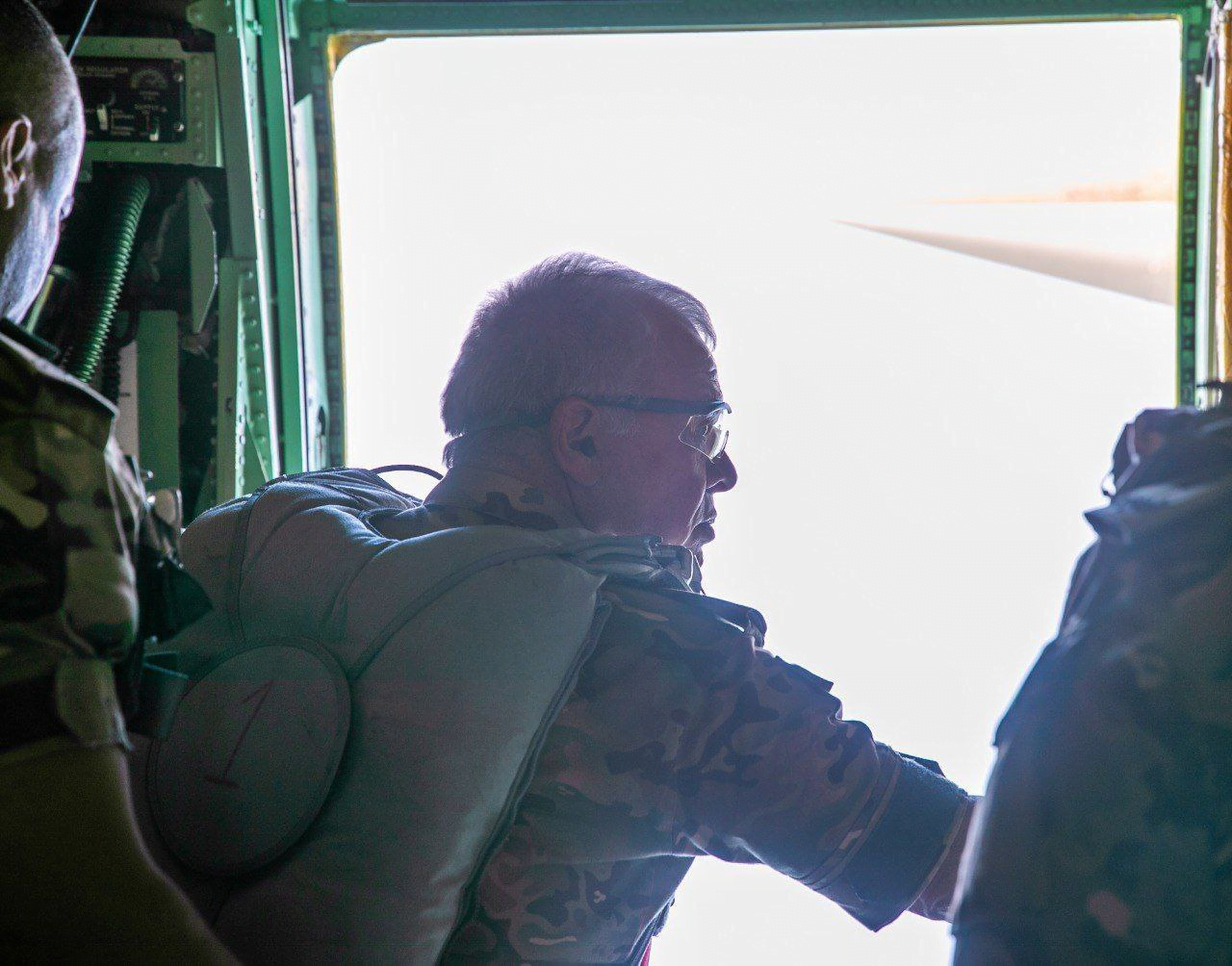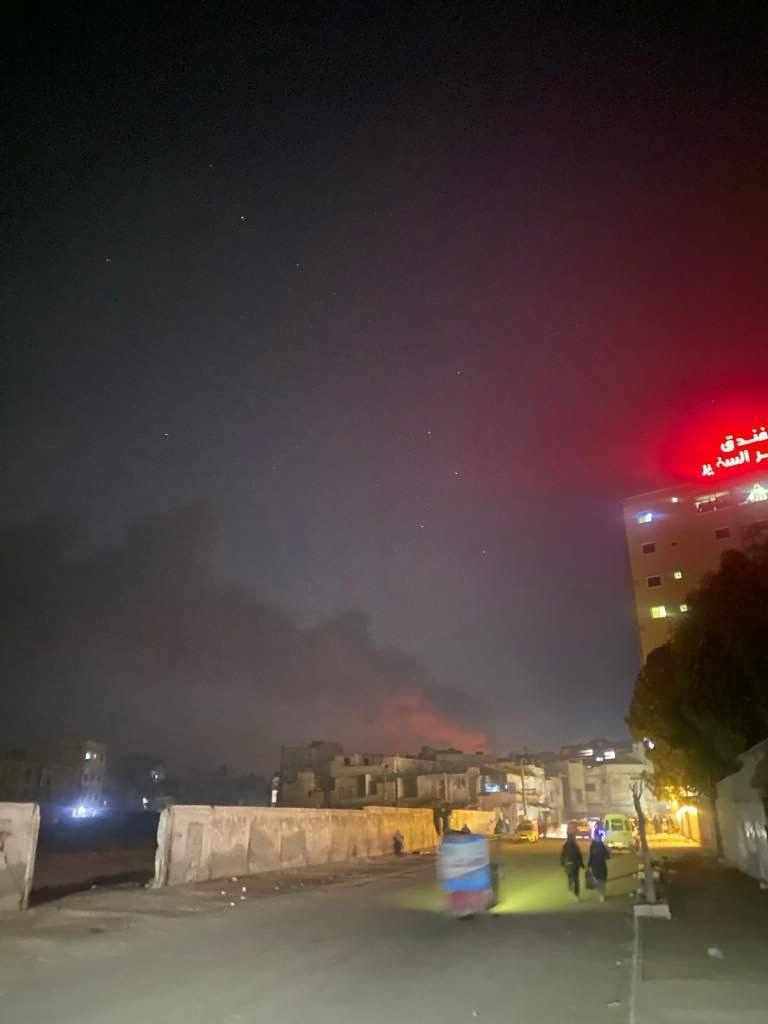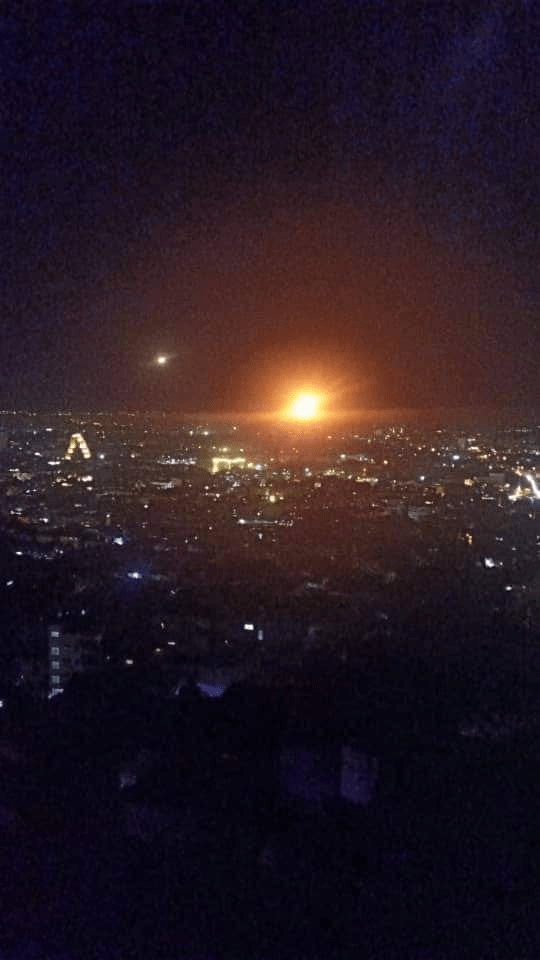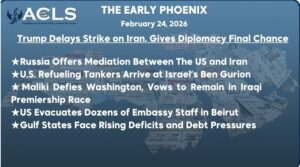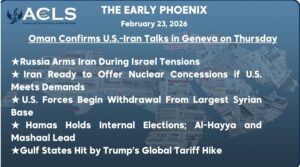Jordanian Aid for Gaza Lost at Sea Despite King’s Oversight
=============
ISRAEL & PALESTINIAN TERRITORIES
1.Rift Grows in Israeli Government Over Ramadan Security

Ramadan security challenges in Jerusalem are causing more rift within the Israeli government. After Ben Gavir recent decree to restrict the entry of Palestinians from the West Bank and is pushing for banning Arab Israeli citizens below the age of 70 from visiting the site during the Muslim’s holy month. Shortly after the October 7 Hamas assault on Israel which is called “Operation Al-Aqsa Flood” in an attempt to claim religious and Arab legitimacy, Mohammad Deif, the group’s military leader, called on Arabs in Jerusalem and inside Israel to “set the earth on fire under the fleet of the occupiers.” Defense Minister Yoav Gallant speaking at an assessment at the IDF Central Command, pointed that Iran, Hezbollah, and Hamas are aiming to take advantage of Ramadan to turn it into “the second-stage of October 7, and ignite the ground.” In comments aimed at the National Security Minister Itamar Ben Gvir, Gallant warned about giving Hamas the chance to converge the combat fronts, stressing against “irresponsible statements from people who are supposed to be responsible” leading to provoked escalation soon. Ismail Haniyeh, Hamas’ political bureau chairman, in a video speech at the Jerusalem Institution Conference in Beirut, discussed the recent cease-fire talks. He stated that Hamas was flexible in negotiations, criticized Israel for its military actions targeting civilians, and urged Arabs in Israel, East Jerusalem, and the West Bank to gather at the Al-Aqsa Mosque for Ramadan, emphasizing the importance of doing the Islamic retreats inside the mosque for the whole month. Israeli Channel 12 reported on Wednesday that the War Council has removed authority over Al-Aqsa Mosque access from National Security Minister Itamar Ben Gvir. Palestinians and Jerusalemites will face no entry restrictions to Al-Aqsa Mosque during Ramadan.
2.Jordanian Aid for Gaza Lost at Sea Despite King’s Oversight
King Abdullah of Jordan personally oversaw the second airdrop of aid to Gaza after the initial shipment was lost in the water. Despite these efforts, the parachuted supplies once again ended up in the sea. Additionally, aid intended for Gaza, dispatched from Egypt and parachuted into the Rafah area, mistakenly landed back on Egyptian territory.
3.U.S. Probes Finkelstein Metals for Subsidy Violations
The U.S. government initiates an investigation into allegations that Finkelstein Metals received illegal government subsidies, leading to inflated prices in the U.S. market. Despite controlling less than 3% of the U.S. market share, sanctions against the company threaten its operational capacity and the broader Israeli defense industry, including Iron Dome’s production chain. This unprecedented inquiry, according to Israeli media, risks disrupting the longstanding trade relationship between Israel and the U.S. Israeli officials and the Manufacturers’ Association have stepped in, warning of the potential damage to Israeli exporters and the defense sector.
4.Iranian Hackers Target Israeli Cyber Space with Hostage Decoy Site
Iranian hackers affiliated with the IRGC, known as UNC1546 or Tortoiseshell, are launching sophisticated cyberattacks on aerospace, defense, and cybersecurity sectors in Israel and the UAE. They use deceptive tactics like spear phishing, watering hole attacks, and a fake site promoting the “Bring Them Home Now” movement to distribute malware, compromise systems, and steal sensitive information. Google’s Mandiant reports these activities, revealing a strategic shift by the hackers to gather intelligence for Iran’s interests, with potential targets expanding to Turkey, India, and Albania.
5.IDF Strikes Gaza, Lebanon, And Syria
Lebanese media reports about an Israeli strike that targeted the house of Hezbollah leader commander, Ali Wehbe in Bint Jbeil, while also bombing Beit Leef, Ramyeh, Ainata, and Al-Khraybeh. Using 40 Grad rockets, Hamas responds targeting Hero Camp and the airstrip in Beit Hillal. The IDF retaliates with airstrikes on southern Lebanon, targeting Hezbollah’s munition storage and military infrastructure without causing injuries in Kiryat Shmona.
Later in the evening, Israel strikes Sayida Zainab’s neighborhood and Sulimani Military Camp in Babilya. The exact death toll results have not been reported as of it.
=============
IRAN
1.Global Recognition of Iran’s Ties to Al-Qaeda Confirmed
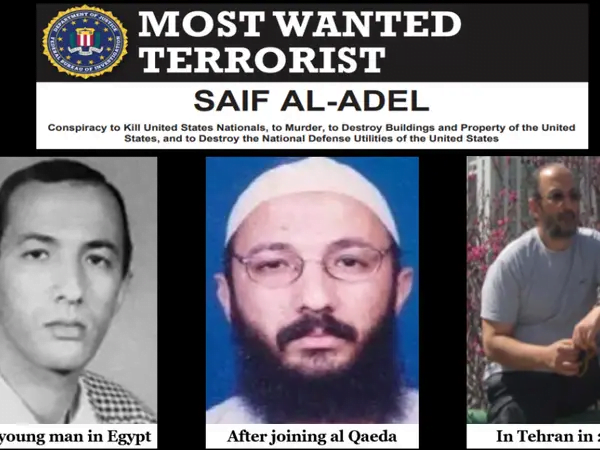
The U.S. has acknowledged Iran’s significant role in aiding al-Qaeda, highlighting its function as a major conduit for the group’s resources and operatives worldwide. This includes hosting key figures like Saif al-Adel, who, following the death of Ayman Al Zaouhri, is poised to become the group’s next leader. The presence of al-Adel in Iran, a major player in global terrorism, underscores the critical nature of Iran’s support for al-Qaeda. This situation, spotlighted by both the U.S. and UN Security Council, raises grave concerns about Tehran’s deep-seated connections to terrorist networks and the implications for international security.
2.Economic Crisis in Iran Highlighted by Leaked Funding Request
A leaked letter from Khamenei’s chief of staff requesting increased funding for religious entities amid Iran’s economic turmoil reveals the nation’s fiscal challenges. Facing over 40% inflation and public dissatisfaction due to stagnant wages, the government prioritizes religious and military expenditures. This situation, exposed by opposition hackers, demonstrates the severity of Iran’s economic decline and the contentious allocation of resources.
3.Iran Applauds U.S. Airman’s Self-Immolation
Tehran Times highlights Iran’s Foreign Ministry praising Aaron Bushnell’s self-immolation as a potent condemnation of U.S. support for Israeli actions in Gaza. Iran strategically utilizes the incident to underscore American complicity in Palestinian suffering, amplifying anti-Biden sentiments and pro-Palestinian activism. By capitalizing on Bushnell’s tragic act, Iran aims to fuel discontent towards Biden’s policies, positioning itself as a vocal critic of U.S.-Israeli alliance while advancing its own political objectives.
4.Iran Touts Houthi Disruption of Israeli Trade
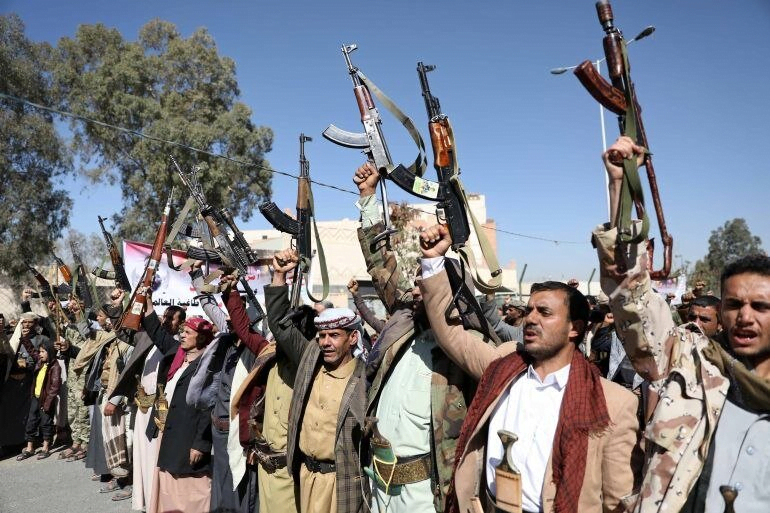
Iran’s Tehran Times hails Ansar Allah’s disruption of Israeli trade routes, detailing attacks on container ships in the Red Sea, causing the closure of Eilat port. They stress that only Israeli ships will be targeted, complicating maritime trade for Tel Aviv. Meanwhile, they accuse Israel of exaggerating Yemeni actions’ threat to international trade security, urging focus on ending Gaza’s plight. Iran highlights the Houthis diverse ways of fighting back, like messing with the economy and launching missiles, shaking up the region.
5.Khamenei Blocks Son’s Leadership Speculation
Ahead of the Leadership Council of Experts’ elections, Supreme Leader Ali Khamenei intervened to prevent his son’s nomination as his successor, emphasizing merit over familial ties. Mahmoud Mohammadi Iraqi revealed a discussion within a tripartite committee about potential leaders, including Khamenei’s son, which the Supreme Leader promptly halted to avoid nepotism allegations. This move underscores the secretive and sensitive nature of selecting Iran’s next leader, amid a backdrop of sanctions and internal debates on leadership succession, with figures like Ebrahim Raisi and Hassan Khomeini considered alongside the strictly guarded process.
=============
SYRIA
1.Suwayda Uprising: First Protester Killed by Syrian Forces
The Suwayda uprising, which has been a peaceful movement for several months, marks its first fatality today as Syrian regime forces fatally shot Jawad Al-Barouki, 54, during a February 28, 2024 protest. Demonstrators, attempting to storm the Security Settlements Center in the April 7 Hall, faced regime gunfire, escalating the conflict. This action resulted in Al-Barouki’s death from a ricocheting bullet and injured Walid Al-Jawhari. The incident has prompted widespread tension and calls for restraint within the Druze community. Sheikh Hikmat Al-Hijri, a Druze leader, urged protestors to maintain their peaceful stance. Al-Barouki’s killing emphasizes the growing rift between the regime and demonstrators against settlement policies, and the challenges of keeping protests non-violent.
2.Iran Vows to Stay in Assad Areas, Rejects Withdrawal Claims
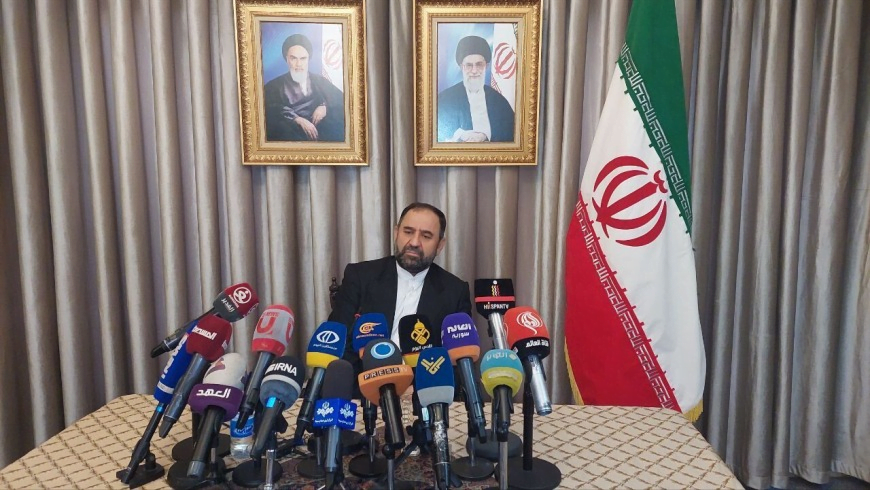
Iran’s envoy to Assad, Hussein Akbari, confirmed Iran’s continuous presence in territories controlled by Assad, dismissing any rumors of withdrawal. He emphasized that the relationship between Iran and Assad is principled, underlining Iran’s unwavering support. Akbari also verified that Iran’s actions in Syria are in full coordination with Assad’s government, following Assad’s policies. Furthermore, Ezatollah Akbari Talarbashti, leader of Iran’s Parliament for Industries, highlighted that despite considerable sacrifices in Syria, Iran controls merely 3-4% of the Syrian market, in stark contrast to Turkey’s 75% share. Meanwhile, Assad was busy with prompting that Russia’s military involvement in Syria was to safeguard Moscow against terrorism, comparing the challenges faced by Syria and Ukraine and stressing a collective stand against shared foes.
3.Crisis and Controversy Surround HTS Leadership
Protests against HTS and its leader, Abu Muhammad al-Julani, in Idlib signal a crisis, echoing past challenges in 2017. Dissenters demand al-Julani’s removal over mismanagement and wrongful detentions, leading him to release and compensate detainees. Al-Julani’s efforts to quell dissent through releasing and compensating previously detained rivals inadvertently intensified internal divisions, weakening his leadership further. This unrest is exacerbated by a notable public resignation, underscoring the division within HTS leadership itself. Critics within HTS demand significant reforms, including al-Julani’s resignation, the unconditional release of political prisoners, and the establishment of a genuine Shura Council. Despite considering a strategy of appointing a nominal leader while retaining control, al-Julani faces widespread skepticism, with observers questioning the approach’s effectiveness in resolving the organization’s internal discord and preventing further conflict.
4.Iran and Turkiye Strike Syria’s Northeast
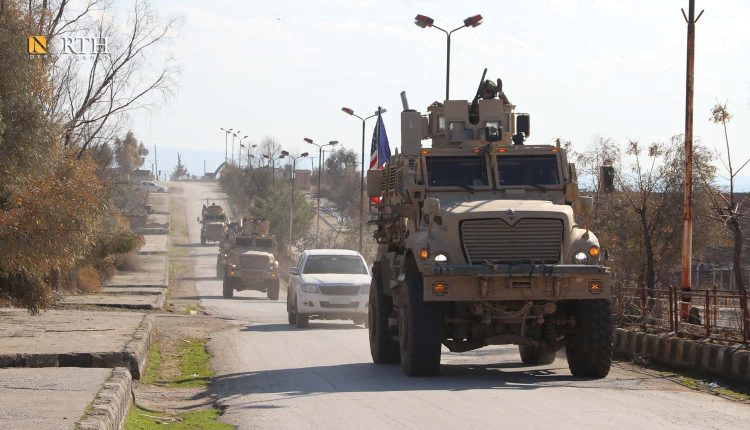
In a series of violent escalations in Syria’s northeast, American bases in Deir ez-Zor were attacked with missiles and a drone by the “Islamic Resistance in Iraq” group, prompting US retaliation against Iranian-backed factions. Concurrently, Turkish forces conducted air strikes on the Hasakah countryside, resulting in 11 casualties, including six civilians, but lost a Turkish reconnaissance drone in Aleppo’s northern countryside, with no party claiming responsibility. The attacks underscore the volatile dynamics involving multiple international and local forces in the region. Additionally, violent clashes erupted between Arab tribal forces and SDF militias in the eastern countryside of Deir ez-Zor, further intensifying the region’s instability.
=============
TURKIYE
1.Once Again, Türkiye Plays a Pivotal Role in the Russian-Ukraine War
President Recep Tayyip Erdoğan reaffirms Türkiye’s commitment to diplomacy and dialogue, highlighting Ankara’s support for Ukrainian sovereignty and the protection of Crimean Tatars’ rights during recent warnings of attempts to overthrow Ukrainian President Volodymyr Zelenskyy and Russia’s territorial advancements, Türkiye’s stance underscores the importance of a diplomatic resolution. Erdoğan backs Zelenskyy’s 10-point peace plan and expresses readiness to contribute to Ukraine’s reconstruction. The upcoming visit of Russian Foreign Minister Sergei Lavrov to Türkiye for bilateral talks and the Antalya Diplomacy Forum further positions Türkiye as a crucial intermediary.
=============
IRAQ
1.Iran Backs Armenia in Iraq Investment Talks
As Azerbaijan secures its position as Israel’s foremost energy provider, Armenia, with Iran’s backing, actively seeks to fortify economic relations with Iraq. Iraqi Prime Minister Mohammed Shia Al-Sudani welcomed Armenian companies to participate in significant initiatives such as the Development Road and the Al-Faw Grand Port project.
2.Iraq Seizes 80kg of Captagon in Anbar
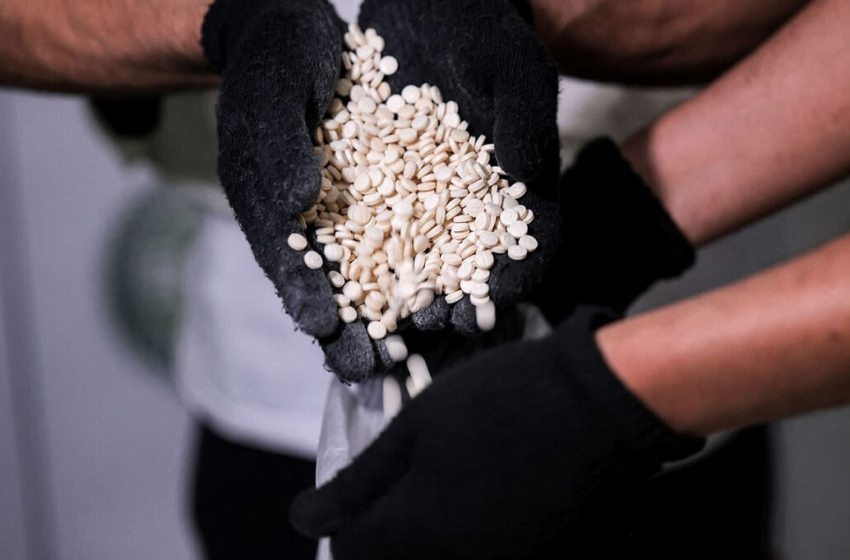
In a targeted operation against drug smuggling, Iraq’s General Directorate of Narcotics Control confiscated 80 kilograms of Captagon pills in the western governorate of Anbar. This significant seizure underlines the government’s ongoing efforts to combat the narcotics trade within its borders. Alongside the drugs, authorities detained four individuals suspected of involvement in the trafficking network, marking a critical step in Iraq’s broader strategy to curb the spread of illegal substances and dismantle smuggling operations.
=============
EGYPT
1.Egypt Inks $41 Billion Green Energy Deals
Egypt has signed seven Memoranda of Understanding (MOUs) with global developers for green hydrogen and renewable energy projects, announcing investments of $41 billion over the next decade. The ceremony, attended by Prime Minister Mostafa Madbouly and key ministers, marks Egypt’s ambition to become a regional hub for green energy, highlighting partnerships for projects in the Suez Canal Economic Zone and the launch of Africa’s first green ammonia plant. Additionally, Egypt is studying an Italian proposal to establish a $4 billion industrial complex for the manufacture of advanced iron and steel products. The project is expected to provide 17,000 direct and indirect job opportunities, and it also aims to attract investors to establish a green hydrogen production plant with investments estimated at a value ranging between 2 to 3 billion dollars.
=============
YEMEN
1.Germany Intercepts Houthi Missiles in Red Sea
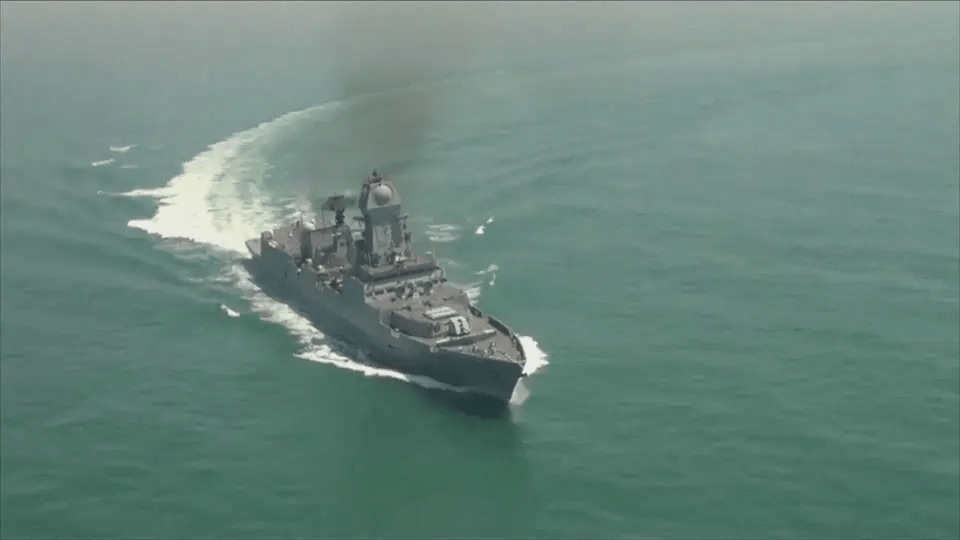
On Feb. 27, the German frigate “Hessen” shot down two drones launched by Iran-backed Houthis in the Red Sea. In related actions, U.S. aircraft and a coalition warship destroyed five Houthi UAVs targeting commercial and naval vessels from Houthi-controlled areas in Yemen. A Marshall Islands-flagged cargo ship and a Panama-flagged tanker reported a missile landing nearby, 63 nautical miles northwest of Hodeidah, Yemen.
=============
THE GULF
1.Qatar-France $200 Million Aid Pact for Palestine
During a two-day visit to Paris by the Emir of Qatar, Sheikh Tamim bin Hamad Al Thani, at the invitation of French President Emmanuel Macron, both leaders announced a $200 million contribution to support the Palestinian people. This joint statement concluded the Emir’s visit, highlighting their efforts to address the humanitarian crisis in Gaza. They emphasized the need for a two-state solution and the immediate opening of crossings for humanitarian aid. Additionally, Macron appreciated Qatar’s role in mediating the release of hostages in Gaza. The leaders also discussed extending their economic, trade, and investment partnerships, including a strategic agreement to finance emerging companies in France with 10 billion euros over six years. This collaboration aims to benefit sectors such as energy, health, and technology, reflecting the strong investment ties between Qatar and France.
=============
📌 Incase you missed it,
📰 Iran’s Imminent Game: Steering Assad Toward an Inevitable Clash with Israel
🔗 Follow the latest news from the American Center for Levant Studies via Google News
The Early Phoenix aims to inform American policy makers, Washington Think Tanks and Research Institutes with curated daily open-source events relevant to national security.
These updates entail political, economic, and military insights into Israel, Iran, Iraq, Yemen, Lebanon, Syria, Egypt, the Arabian Gulf Nations, and Turkiye.
The American Center for Levant Studies’ The Early Phoenix daily Newsletter and The Region Projects will serve as a hub for in-depth studies and policy recommendations.
We would appreciate your support in sharing these vital reports with your contacts with a brief recommendation to subscribe to our daily email updates, here.

